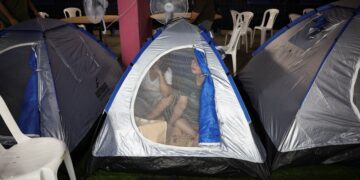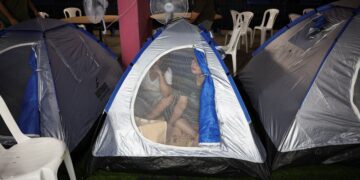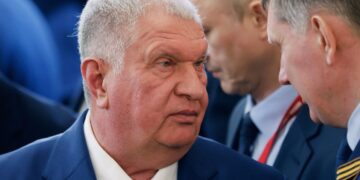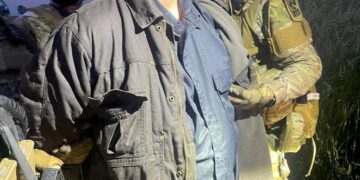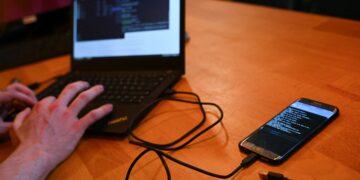JERUSALEM/WASHINGTON (Reuters) -Israel said on Saturday it had killed a veteran Iranian commander as the countries traded attacks, a day after Tehran said it would not negotiate over its nuclear programme while under threat and Europe tried to keep peace talks alive.
Saeed Izadi, who led the Palestine Corps of the Quds Force, the Iranian Revolutionary Guards’ overseas arm, was killed in a strike in an apartment in the Iranian city of Qom, said Israeli Defense Minister Israel Katz.
Calling his killing a “major achievement for Israeli intelligence and the Air Force”, Katz said in a statement that Izadi had financed and armed the Palestinian militant group Hamas ahead of its October 7, 2023, attack on Israel, which triggered the war in Gaza.
The Revolutionary Guards said five of its members had been killed in attacks on Khorramabad, according to Iranian media reports that did not mention Izadi, who was on U.S. and British sanctions lists.
Iranian media had said earlier on Saturday that Israel had attacked a building in Qom, with initial reports of a 16-year-old killed and two people injured.
Iran’s Fars news agency said Israel had targeted the Isfahan nuclear facility, one of the nation’s biggest, but there was no leakage of hazardous materials.
The Israeli military said it had launched a wave of attacks against missile storage and launch infrastructure sites in Iran.
Ali Shamkhani, a close ally of Iran’s supreme leader, said he had survived an Israeli attack. “It was my fate to stay with a wounded body, so I stay to continue to be the reason for the enemy’s hostility,” he said in a message carried by state media.
Early on Saturday, the Israeli military warned of an incoming missile barrage from Iran, triggering air raid sirens across parts of central Israel, including Tel Aviv, as well as in the Israeli-occupied West Bank.
Interceptions were visible in the sky over Tel Aviv, with explosions echoing across the metropolitan area as Israel’s air defence systems responded. There were no reports of casualties.
IRAN’S NUCLEAR PROGRAMME
Israel began attacking Iran on June 13, saying its longtime enemy was on the verge of developing nuclear weapons. Iran, which says its nuclear programme is only for peaceful purposes, retaliated with missile and drone strikes on Israel.
Israel is widely assumed to possess nuclear weapons. It neither confirms nor denies this.
Its air attacks have killed 639 people in Iran, according to the Human Rights Activists News Agency, a U.S.-based human rights organisation that tracks Iran. The dead include the military’s top echelon and nuclear scientists.
Iran’s health minister, Mohammadreza Zafarqandi, said on Saturday that Israel has attacked three hospitals during the conflict, killing two health workers and a child, and has targeted six ambulances, according to Fars.
The Israeli military did not immediately respond to a request for comment. An Iranian missile hit a hospital in the southern Israeli city of Beersheba on Thursday.
Iran’s NOURNEWS on Saturday named 15 air defence officers and soldiers it said had been killed in the conflict with Israel.
In Israel, 24 civilians have been killed in Iranian missile attacks, according to Israeli authorities.
U.S. President Donald Trump said on Friday he thought Iran would be able to have a nuclear weapon “within a matter of weeks, or certainly within a matter of months”. He told reporters at the airport in Morristown, New Jersey: “We can’t let that happen.”
He said his director of national intelligence, Tulsi Gabbard, was wrong in suggesting there was no evidence Iran is building a nuclear weapon.
SCANT PROGRESS IN GENEVA
Iranian Foreign Minister Abbas Araqchi said there was no room for negotiations with the U.S. “until Israeli aggression stops”. But he arrived in Geneva on Friday for talks with European foreign ministers at which Europe hopes to establish a path back to diplomacy.
Trump reiterated that he would take up to two weeks to decide whether the United States should enter the conflict on Israel’s side, enough time “to see whether or not people come to their senses”, he said.
Trump said he was unlikely to press Israel to scale back its airstrikes to allow negotiations to continue.
“I think it’s very hard to make that request right now. If somebody is winning, it’s a little bit harder to do than if somebody is losing, but we’re ready, willing and able, and we’ve been speaking to Iran, and we’ll see what happens,” he said.
The Geneva talks produced little signs of progress, and Trump said he doubted negotiators would be able to secure a ceasefire.
“Iran doesn’t want to speak to Europe. They want to speak to us. Europe is not going to be able to help in this one,” Trump said.
Hundreds of U.S. citizens have fled Iran since the air war began, according to a U.S. State Department cable seen by Reuters.
Israel’s envoy to the United Nations, Danny Danon, told the Security Council on Friday his country would not stop its attacks “until Iran’s nuclear threat is dismantled”. Iran’s U.N. envoy Amir Saeid Iravani called for Security Council action and said Tehran was alarmed by reports that the U.S. might join the war.
Russia and China demanded immediate de-escalation.
A senior Iranian official told Reuters that Iran was ready to discuss limitations on uranium enrichment but that it would reject any proposal that barred it from enriching uranium completely, “especially now under Israel’s strikes”.
(Reporting by Reuters; Writing by James Oliphant in Washington; Editing by William Mallard)
By Alexander Cornwell and James Oliphant

